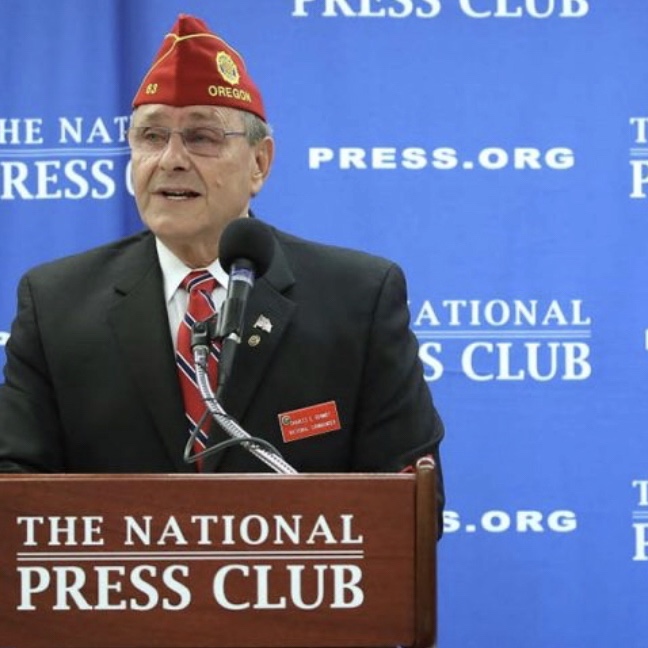
Charles Schmidt, National Commander of the American Legion, speaks to the media while flanked by Verna Jones, Executive Director of the American Legion in the District, during a news conference at the National Press Club on February 22, 2017 in Washington, DC. Schmidt spoke about critical veteran’s issues facing the new Trump administration and Congress. The Legion has now called on Trump to reschedule cannabis for medical research to assist veterans. (Mark Wilson, Getty Images)
Veterans and access to cannabis: 2017 in review
2017 was a year of both setbacks and progress for veterans and their supporters, seeking greater access to legal medical marijuana
PUBLISHED:
2017 was a year of frustration but also incremental progress for military veterans, veterans’ organizations and supporters, as they continued to lobby federal and state politicians to expand legalized medical marijuana research — as well as greater veteran access to legal pot for treatment of a variety of ailments, including chronic pain and Post-Traumatic Stress Disorder (PTSD).
Despite concerns about crackdowns, as well as some setbacks, steady pressure was applied to politicians to at least consider an evolution of current policies. Here’s a roundup of how some of those efforts have played out over the course of this year:
January
The U.S. Air Force announces that previous marijuana use will not disqualify potential recruits to the service.
February
New Mexico’s state legislature advanced a medical marijuana program that would have automatically allowed all military veterans to qualify as patients. But the bill apparently never made to a vote of the full state senate.
A Quinnipiac poll finds 71 percent of Americans opposed a federal crackdown of legal marijuana, while 93 percent are in favor of medical cannabis.
March
Researchers with the non-profit Multidisciplinary Association for Psychedelic Studies (MAPS), sponsors of an FDA-approved study of medical marijuana’s effectiveness to treat PTSD in veterans, make national headlines when they criticize the poor quality and low potency of the federally-grown marijuana made available to researchers by the federal government.
Johns Hopkins University withdraws from the MAPS-sponsored study of cannabis and PTSD in veterans. A university spokesperson said Johns Hopkins’s goals for the study were no longer “in alignment” with those of MAPS. A spokesperson for MAPS, however said the dispute was primarily over the poor quality of the government-supplied marijuana used in the clinical trials.
April
In Texas, veterans rallied alongside conservative Christian moms at the state Capitol in favor of medical marijuana legislation.
May
In Delaware, a bill calling for the expansion of permissible uses for medical marijuana in the state, to include anxiety conditions including PTSD, stalls in the state senate. A weaker version passed two days later.
The American Legion, the nation’s largest veterans service organization, calls on President Trump to reclassify cannabis from its current federal Schedule I status, in order to “clear the way for clinical research in the cutting edge areas of cannabinoid receptor research.” Legion officials stressed they are not advocating for marijuana legalization but want more research on the plant – to “enable our elected leaders and the American people to have a national discussion on the matter based on scientific evidence.”
Speaking at a “State of the VA” address at the White House, Veterans Affairs (VA) Secretary David Shulkin says federal law prevents the department from implementing any potential benefits of medical marijuana for veterans. However, he added, “I believe that everything that could help veterans should be debated by Congress and by medical experts, and we will implement that law. So if there is compelling evidence that this is helpful, I hope that people take a look at that and come up with the right decision, and then we will implement that.”
June
Colorado’s governor Hickenlooper signs into law a bill that adds PTSD as a qualifying condition for medical marijuana patients. The change comes after years of lobbying in the state by veterans.
A bipartisan group of senators and representatives reintroduce legislation in Congress, to protect patients in states where medical marijuana has been legalized. The Compassionate Access, Research Expansion and Respect States (CARERS) Act would not legalize medical marijuana federally, but would amend federal law to officially allow states to set their own medical marijuana policies. Under the bill, VA physicians would be able to recommend medical marijuana to their veteran patients, which they are currently barred from doing.
U.S. Attorney General Jeff Sessions issues a letter to congressional leaders; calling on them to remove current federal protections on medical marijuana in states where it is legal. The protections, previously known as the Rohrabacher-Farr amendment, now the Rohrabacher-Blumenauer amendment, prohibit the Justice Department from using federal funds to prevent certain states “from implementing their own State laws that authorize the use, distribution, possession or cultivation of medical marijuana.”
One of the amendment’s co-authors, Rep. Dana Rohrabacher, R-Calif., says the attorney general was acting in opposition to “an overwhelming majority of Americans and even, sadly, against veterans and other suffering Americans who we now know conclusively are helped dramatically by medical marijuana.”
July
The U.S. Senate Appropriations Committee voted to allow VA doctors in states where medical marijuana is legal to “make appropriate recommendations, fill out forms, or take steps to comply with such a program.” The Veterans Equal Access Amendment to the 2018 Military Construction, Veterans Affairs and Related Agencies Appropriations Bill would also have prohibited federal funds from interfering with a veteran’s ability to take part in medical marijuana programs approved by states. But later that month, the House Rules Committeedecided not to allow the medical marijuana amendment to proceed to a full vote.
A diverse group of cannabis advocates filed a federal lawsuit challenging the constitutionality of the Controlled Substances Act (CSA) as it pertains to marijuana. Attorney General Jeff Sessions and Drug Enforcement Administration (DEA) acting administrator Charles Rosenberg were named as defendants in the lawsuit brought by an Iraq War vet with post-traumatic stress disorder, a former NFL player, two children using medical marijuana, and a social justice nonprofit organization.
August
An independent national organization that supports state legislatures again voiced its support for federal rescheduling of cannabis. The bipartisan National Conference of State Legislatures (NCSL) passed a resolution at its annual meeting asking the federal government to remove cannabis from the Controlled Substances Act.
At its annual national convention, the American Legion passed a resolution urging the federal government to “permit VA medical providers to be able to discuss with veterans the use of marijuana for medical purposes and recommend it in those states where medical marijuana laws exist.” At the same event, Dr. Sue Sisley, who supervises the first federally-approved clinical trial on the effectiveness of medical marijuana as treatment for veterans with PTSD, warns that Arizona-base study is in jeopardy if the Phoenix Veterans Administration Health Care System doesn’t participate with patient recruitment efforts.
September
The American Legion called on the VA to clear away obstacles that threaten the completion of a groundbreaking MAPS clinical study on the use of medical marijuana to treat post-traumatic stress disorder (PTSD) in U.S. military veterans. Denise Rohan, the Legion’s national commander, sent a letter to VA Secretary Shulkin, calling for his “direct involvement” in ensuring “this critical research is fully enabled.”
October
All ten Democratic representatives on the House Committee on Veterans Affairs send a letter to VA Secretary Shulkin, urging him to ensure the VA’s research and development office fulfills “its stated mission,” by allowing research into the effects of marijuana on military veterans suffering from chronic pain and post-traumatic stress disorder.
Delaware Gov. John Carney signs into law the Bravery Bill, which allows PTSD patients to receive a medical marijuana card from any properly licensed physician. Previously, PTSD patients could only get approval for medical marijuana from a licensed psychiatrist.
November
A survey commissioned by the American Legion finds that 81 percent of veterans and 83 percent of caregivers support the federal legalization of cannabis to treat a physical or mental condition.
A bipartisan group of U.S. Representatives, along with several combat veterans and the mother of a Marine who died by suicide after struggling with prescribed pharmaceuticals, urge Congress to advance efforts for medical marijuana research.
On Veteran’s Day, New York Gov. Andrew Cuomo signs legislation to add PTSD to the list of ailments that can legally be treated with medical marijuana in the state.
According to the Marijuana Policy Project, 28 states plus Washington, D.C. now include PTSD in their medical marijuana programs, a number that has reportedly doubled over the past two years.
December
The VA issues a new directive for clinical programs that frees its doctors and pharmacists to discuss marijuana with military vets taking part in state-approved medical marijuana programs. Doctors and pharmacists may discuss marijuana use with vets requesting information, according to the directive.
Retrieved from: http://www.thecannabist.co/2017/12/27/military-veterans-cannabis-legislation-ptsd/95367/

